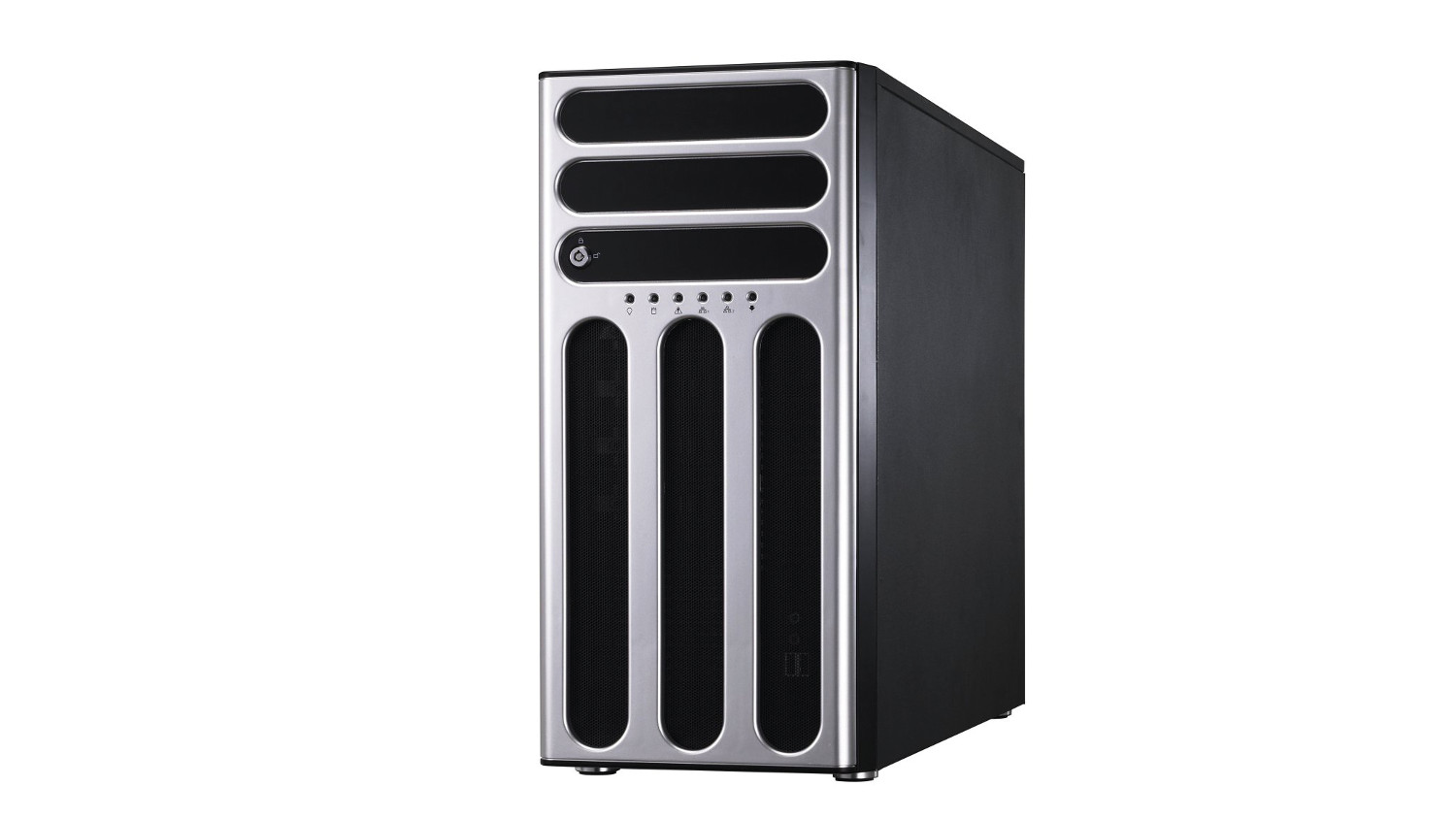Broadberry CyberServe TS300 review
Priced right for SMBs, this quiet, low-energy tower server has plenty of power and room to grow


The CyberServe TS300 is well worth a look for any small or medium-sized business seeking a purpose-built server than can keep up with demand. It offers plenty of power to get started at a low price, with plenty of scope to expand storage and networking capabilities as needed.
-
+
Exceptionally cheap; Power-efficient; Excellent expansion options
-
-
No agentless VMware host monitoring; Web interface lags behind HPE's iLO 4

A server is an investment, and Broadberry's CyberServe TS300 offers plenty of room to expand, so it can serve your evolving needs for many years. It comes with a fine mix of business-class features, storage options are a cut above the rest, and the price is within reach of the smallest business.
Built on Asus' TS300-E9-PS4 server platform, it's also very energy-efficient. We measured this big tower sipping a mere 24W with the OS idle; even with its 3GHz Xeon E3-1220 v6 CPU under maximum load, it peaked at only 69W.
That impressively low power consumption is partly a reflection of the processor's low 72W TDP, but it's also helped by Asus' Beat Thermal Choke III technology, which uses highly conductive gold-treated components to reduce motherboard choke temperatures by up to 3C. Then there's the pair of 240GB Kingston M.2 SATA SSDs, which together draw a miniscule 3W. It all adds up to a server that doesn't need high-speed cooling fans: the SPLnFFT iOS app on our iPad recorded noise levels of just 38.7dB from a metre away, making this server perfect for small offices.
Those twin SSDs come configured as a fast-booting RAID1 array for your OS, and while they're not as quick as NVMe drives, they're still very speedy: Iometer reported raw sequential read and write speeds of 535MB/sec and 368MB/sec. If you prefer, you can specify the server without the SSDs and save 230.
For data storage, the TS300 has an integrated four-bay LFF drive cage ready to receive high-capacity SATA hard disks. It's connected to the motherboard's miniSAS port, which links up with Intel's embedded RSTe (Rapid Storage Technology enterprise) to provide software managed mirrors, stripes and RAID5 arrays for SATA drives.
Storage can be expanded further by adding a second four-bay LFF drive cage, although you'll also need a second RAID card to service it. Optionally, Broadberry can supply an affordable eight-port Asus PCI-Express SAS3 adapter supporting a range of RAID levels up to 6 and 60 and including an optional 2GB of onboard cache memory.
The TS300's four embedded Gigabit Ethernet ports should be ample for most offices, but if you need to add a 10-Gigabit card, it's no problem as the motherboard has three spare PCI-Express slots. Meanwhile, the ASMB8-iKVM plug-in controller, which is included in the price, handles remote server management and activates the dedicated network port. The web interface isn't as clever as HPE's iLO4 but it provides views of sensor data for critical components, basic email alerting facilities and full host and OS remote control as a standard feature.
For general systems management, Asus is still offering its free ASWM, but this doesn't support Windows Server 2016 hosts, and is being replaced by the Asus Control Center (ACC) app. We tested the latest ACC beta by deploying it as an Oracle VirtualBox VM and found it very promising. Features such as agentless VMware host monitoring have yet to be implemented, but once you've deployed the ACC agent on the TS300, you can view its vital signs and easily check on CPU, memory and network port utilisation. You can create multiple accounts with different access permissions, and again set up email alerts for user-defined events.
In all, the CyberServe TS300 is well worth a look for any small or medium-sized business seeking a purpose-built server than can keep up with demand. It offers plenty of power to get started at a low price, with plenty of scope to expand storage and networking capabilities as needed.
This review originally appeared in PC Pro issue 177
Verdict
The CyberServe TS300 is well worth a look for any small or medium-sized business seeking a purpose-built server than can keep up with demand. It offers plenty of power to get started at a low price, with plenty of scope to expand storage and networking capabilities as needed.
Tower chassis
Asus P10S-E/4L motherboard
3GHz Intel Xeon E3-1220 v6
16GB DDR4 (max 64GB)
2 x 240GB Kingston M.2 SATA SSDs
Intel C236
Supports RAID0, 1, 5, 10
3 x PCI-E 3
1 x PCI
4 x Gigabit Ethernet
ASMB8-iKVM with 10/100 Ethernet
500W fixed PSU
218 x 553 x 455mm (WDH)
1yr on-site NBD
Yrs 2-3 advanced replacement warranty
Power: 24W idle, 69W peak
Get the ITPro daily newsletter
Sign up today and you will receive a free copy of our Future Focus 2025 report - the leading guidance on AI, cybersecurity and other IT challenges as per 700+ senior executives
Dave is an IT consultant and freelance journalist specialising in hands-on reviews of computer networking products covering all market sectors from small businesses to enterprises. Founder of Binary Testing Ltd – the UK’s premier independent network testing laboratory - Dave has over 45 years of experience in the IT industry.
Dave has produced many thousands of in-depth business networking product reviews from his lab which have been reproduced globally. Writing for ITPro and its sister title, PC Pro, he covers all areas of business IT infrastructure, including servers, storage, network security, data protection, cloud, infrastructure and services.
-
 Westcon-Comstor and Vectra AI launch brace of new channel initiatives
Westcon-Comstor and Vectra AI launch brace of new channel initiativesNews Westcon-Comstor and Vectra AI have announced the launch of two new channel growth initiatives focused on the managed security service provider (MSSP) space and AWS Marketplace.
By Daniel Todd Published
-
 Third time lucky? Microsoft finally begins roll-out of controversial Recall feature
Third time lucky? Microsoft finally begins roll-out of controversial Recall featureNews The Windows Recall feature has been plagued by setbacks and backlash from security professionals
By Emma Woollacott Published
-
 The UK government wants quantum technology out of the lab and in the hands of enterprises
The UK government wants quantum technology out of the lab and in the hands of enterprisesNews The UK government has unveiled plans to invest £121 million in quantum computing projects in an effort to drive real-world applications and adoption rates.
By Emma Woollacott Published